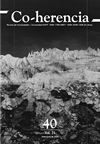The Ethical Turn and the Problem of the Good Life in the Last Generation of Critical Theory
Main Article Content
Keywords
Appropriation, ethical turn, recognition, resonance, good life, discourse ethics
Abstract
This article aims to examine the three critical theories which are part of the so-called ethical turn initiated by Axel Honneth with his theory of recognition and continued by Hartmut Rosa and Rahel Jaeggi with their respective conceptions of a sociology of the good life in the form of resonance and a dialectical-pragmatic conception of the processes of emancipation of forms of life. The main purpose is to distinguish the place they give to the ethico-affective dimension of the good life, with respect to the ethical-abstinent normative traditions, oriented rather by a concept of justice.
Downloads
References
Basaure, M. (2011). Reificación y crítica de las patologías sociales en el marco del proyecto de teoría crítica de Axel Honneth. Enrahonar, (46), 75-91. https://goo.su/Yvx5pk.
Benhabib, S. (1990). Afterword: Communicative Ethics and Contemporary Controversies in Practical Philosophy. En S. Benhabib & F. R.
Dallmayr (Eds.), The Communicative Ethics Controversy (pp. 330-370). MIT Press.
Benjamin, W. (2005). Capitalism as Religion. En E. Mendieta, The Frankfurt School on Religion (págs. 259-262). Rouletdge.
D’Ambrosio, P. J. (2020). The Good Life Today: A Collaborative Engagement between Daoism and Hartmut Rosa. Dao, 19(1), 53-68.
https://doi.org/10.1007/s11712-019-09703-1
Gros, A. (2019). Towards a Phenomenological Critical Theory: Hartmut Rosa’s Sociology of the Relationship to the World. Revista Científica FOZ, 2(1), 8-46. https://goo.su/AryeSB.
Gros, A. (2021). Las formas de vida y su aceleración: un diálogo entre las perspectivas de Rahel Jaeggi y Hartmut Rosa. Castalia. Revista de Psicología, (37), 93-114. https://doi.org/10.25074/07198051.37.2218.
Habermas, J. (1992). Teoría de la Acción Comunicativa, II. Crítica de la razón funcionalista. Taurus.
Habermas, J. (1998). Escritos sobre moralidad y eticidad (M. Jiménez Redondo, Trad.). Paidós.
Habermas, J. (2000). Aclaraciones a la ética del discurso (J. Mardomingo, Trad.). Trotta.
Habermas, J. (2002). Acción comunicativa y razón sin trascendencia (P. Fabra I. Abat, Trad.). Paidós.
Habermas, J. (2021). Once again: On the relationship between morality and ethical life. European Journal of Philosophy, 29(3), 543-551. https://doi.org/10.1111/ejop.12716.
Hegel, G. W. (1999 [1820]). Principios de la filosofía del derecho (J. L. Vermal, Trad.). Edhasa.
Hegel, G. W. (2005 [1827]). Enciclopedia de las ciencias filosóficas (R. Valls Plana, Trad.). Alianza.
Honneth, A. (1997). La lucha por el reconocimiento. Por una gramática moral de los conflictos sociales (M. Ballestero, Trad.). Crítica/Grijalbo.
Honneth, A. (2011). La dinámica social del desprecio. Para determinar la posición de una Teoría Crítica de la sociedad. En A. Honneth, Crítica del agravio moral. Patologías de la sociedad contemporánea (pp. 249-274). Trotta.
Honneth, A. (2012). The I in We Studies in the Theory of Recognition. Polity Press.
Honneth, A. (2014). El derecho a la libertad. Esbozo de una eticidad democrática (G. Calderón, Trad.). Katz.
Honneth, A. (2021). Recognition. Cambridge University Press. https://doi.org/10.1017/9781108872775.
Jaeggi, R. (2014). Alienation (F. Neuhouser & A. E. Smith, Trads). Columbia University Press.
Jaeggi, R. (2018a). Critique of Forms of Life (C. Cronin, Trad.). The Belknap Press of Harvard University Press.
Jaeggi, R. (2018b). Reply to my Critics. En A. Allen, & E. Mendieta (Eds.), From Alienation to Forms of Life (pp. 188-235). Penn State University Press. https://doi.org/10.1515/9780271081663-011.
Marcuse, H. (2005 [1964]). El hombre unidimensional. Ensayo sobre la ideología de la sociedad industrial avanzada (2.a ed., A. Elorza, Trad.). Ariel.
Montero, D. (2020). Aceleración social, modernidades múltiples y culturas democráticas. Re-examinando la teoría de la modernidad de Hartmut Rosa. Cuadernos de Teoría Social, 6(11), 11-36. https://doi.org/10.32995/0719-64232020v6n11-97.
Rawls, J. (1978). Teoría de la justicia (M. D. González, Trad.). FCE.
Rosa, H. (2013). Social Acceleration. A New Theory of Modernity. Columbia University Press.
Rosa, H. (2017). Available, accessible, attainable: the mindset of growth and the resonance conception of the good life. En H. Rosa, & C. Henning (Eds.), The Good Life Beyond Growth (pp. 39-53). Routledge.
Rosa, H. (2019a). La “resonancia” como concepto fundamental de una sociología de la relación con el mundo. Revista Diferencias, (7), 71-81. https://goo.su/euUx.
Rosa, H. (2019b). Resonancia. Una sociología de la relación con el mundo. (A. E. Gros, Trad.). Katz.
Rosa, H. (2020). The Uncontrollability of the World. Polity Press.
Taylor, C. (1983). Hegel y la Sociedad Moderna. FCE.
Weber, M. (2002 [1922]). Economía y sociedad (J. M. Echavarría et al., Trads.). FCE.





